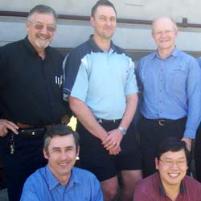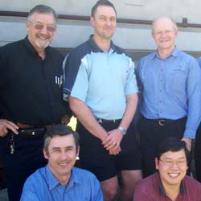Rail collaboration to save millions
Published on 11 October, 2005
Top Australian engineering researchers and rail industry personnel joined forces at CQU Rockhampton last Friday, October 7, as part of a world-leading Rail CRC research project set to save the Australian rail industry millions of dollars through the development of new fail-safe braking technology.
 Incorporating technology developed by Professor Peter Wolfs and his team at CQU, the project is expected to deliver the rail industry a new fail-safe braking product at a fraction of the cost of modern electronic brake systems on the international market.
Incorporating technology developed by Professor Peter Wolfs and his team at CQU, the project is expected to deliver the rail industry a new fail-safe braking product at a fraction of the cost of modern electronic brake systems on the international market.
According to research project leader Professor Bruce Kuhnell from Monash University, the new Monash Electronically Controlled Pneumatic (MECP) Brake system is expected to deliver up to 50 per cent reductions in stopping distances compared to current conventional brakes.
“Australia’s freight task is expected to double by 2020 with five kilometre or longer trains a common sight, so optimal and cost-effective braking systems are critical for the rail industry,” said Mr Kuhnell.
Mr Barry Payne, Brake Engineer for Queensland Rail, said the industry was facing a situation where trains were running near to the limits of signalling on conventional air brakes.
“If we fit them with MECP we could pull up shorter, allowing longer trains to still achieve the required stopping distances,” Mr Payne said.
Recent testing of the MECP brake design on Queensland Rail trains in Gladstone scored a significant win, with further industry testing planned over the next 12 months, before expected commercialisation by early 2007.
 While the specific cost of the MECP has not yet been determined, it is expected to be significantly cheaper than current international ECP systems and also provide for the use of the existing pneumatic brake equipment for a better braking system.
While the specific cost of the MECP has not yet been determined, it is expected to be significantly cheaper than current international ECP systems and also provide for the use of the existing pneumatic brake equipment for a better braking system.
MECP technology’s expected value to the Australian rail industry is $24 million, estimated by independent consultant STEM Partnerships 2005.
Photo: CQU, Monash and Queensland Rail personnel take a break from their MECP research project meetings at CQU on Friday. Picture: (Back left to right) Bruce Kuhnell (Monash), Peter Thomas (CQU), Peter Wolfs (CQU). (Front left to right) Colin Cole (CQU), Mervyn Tan (Monash).

